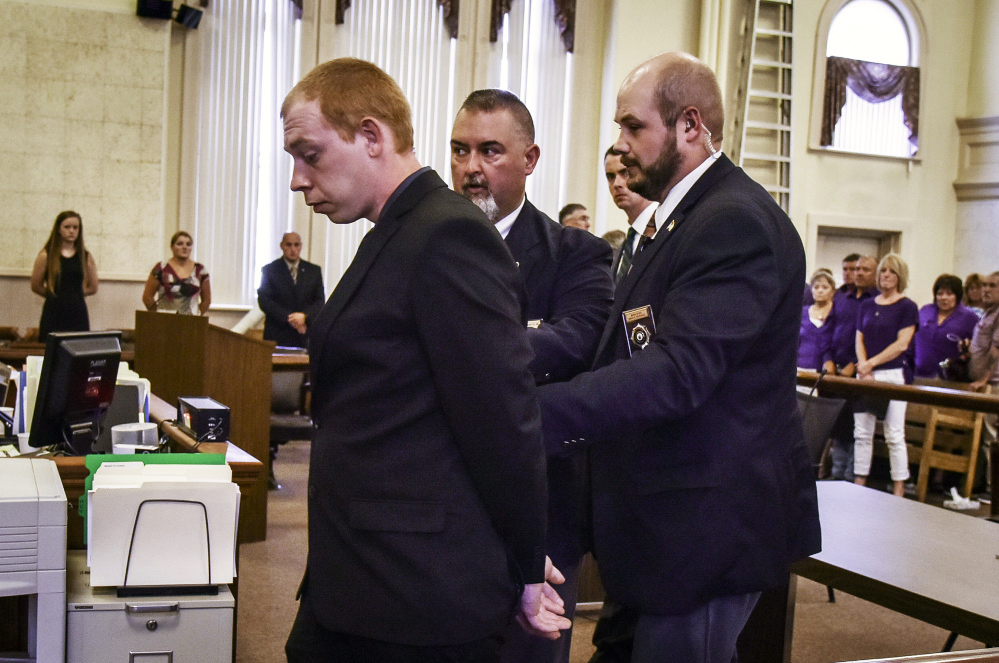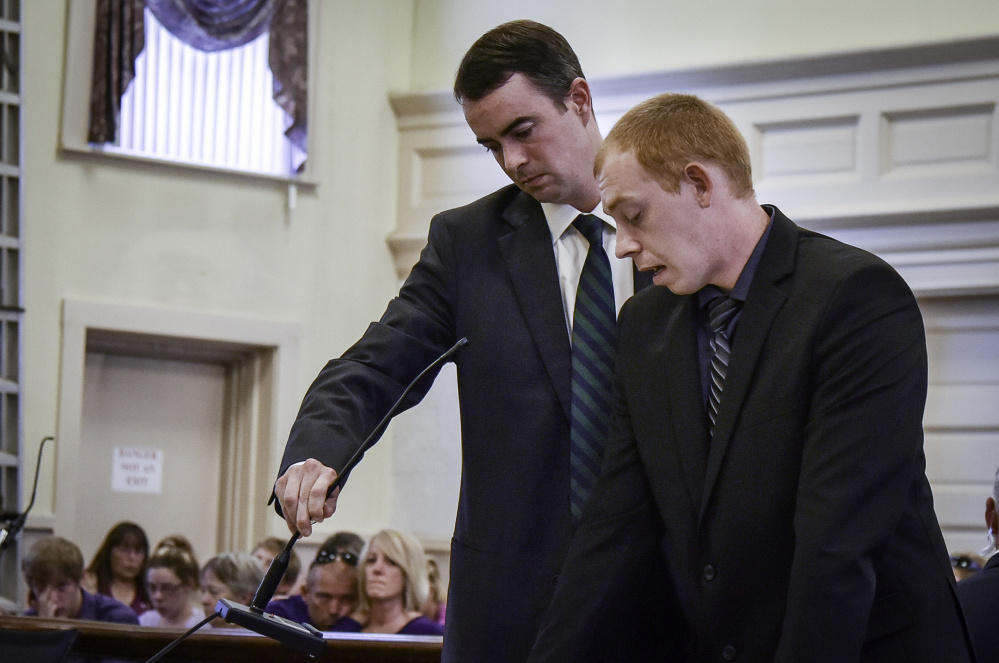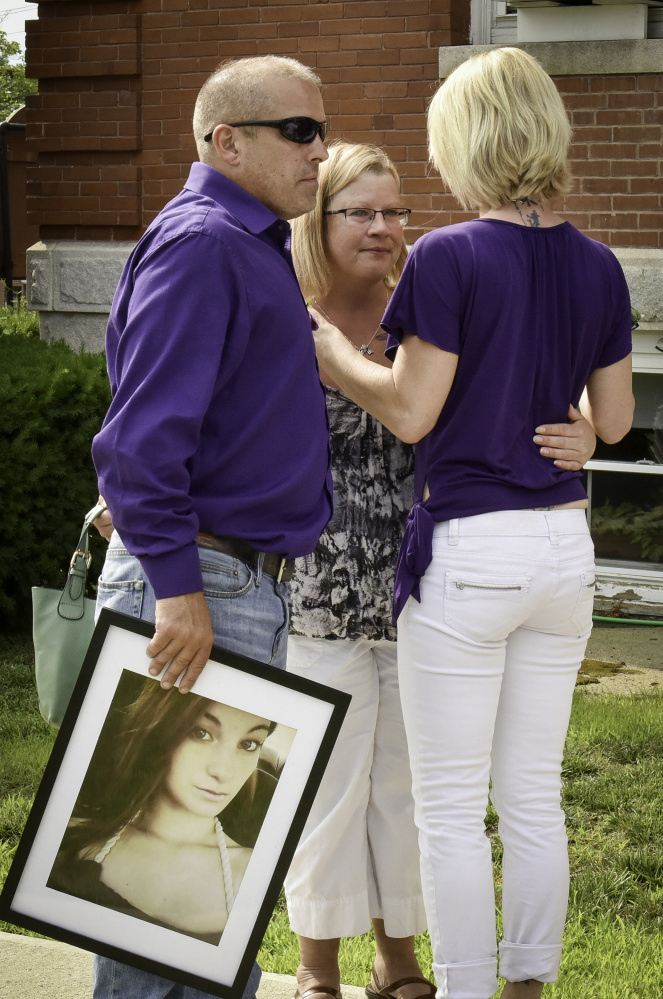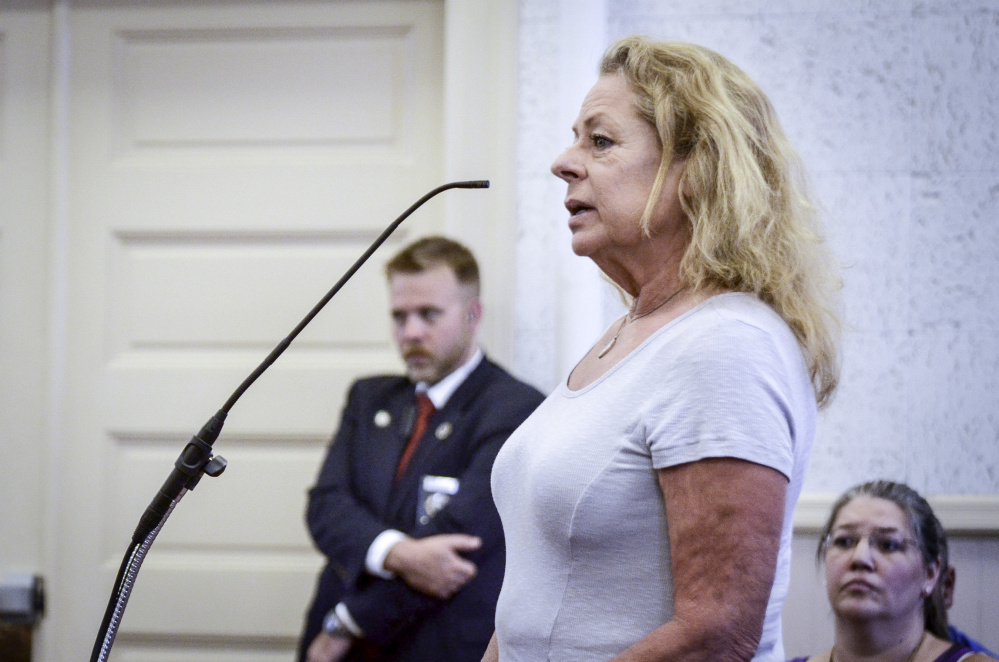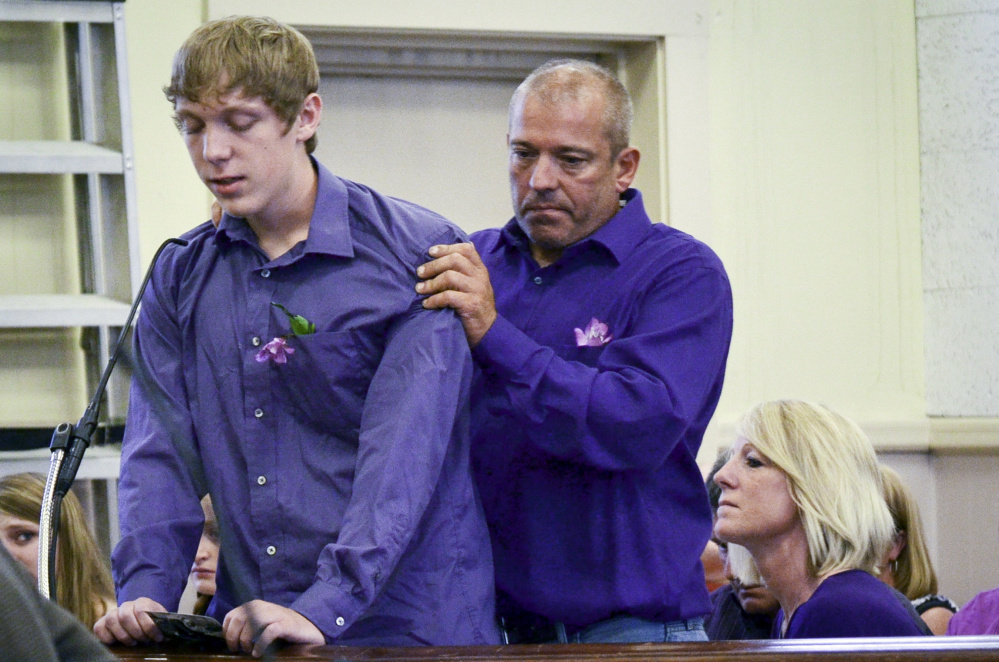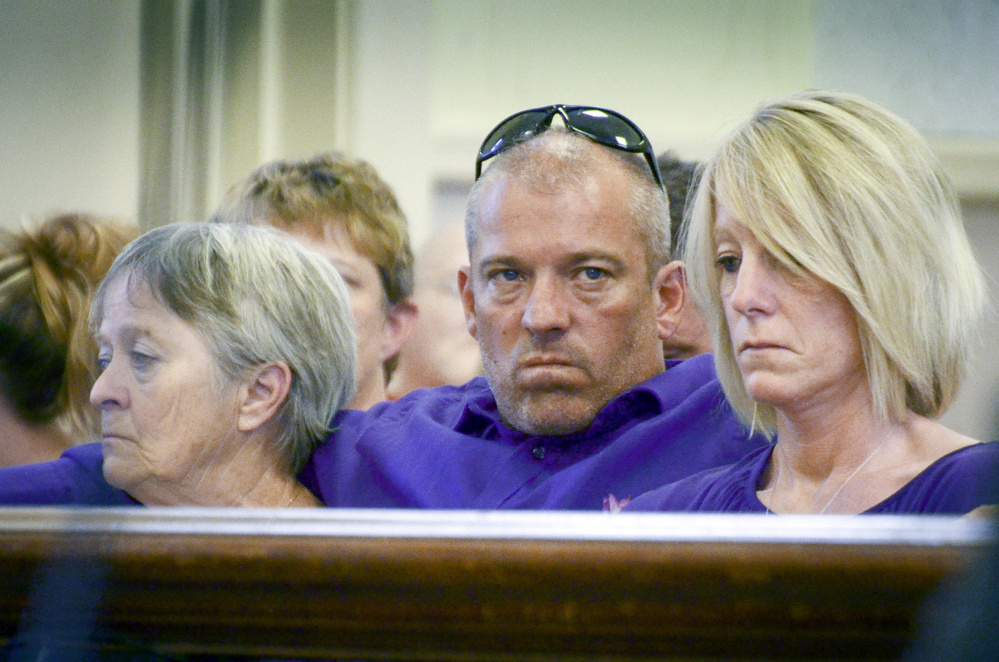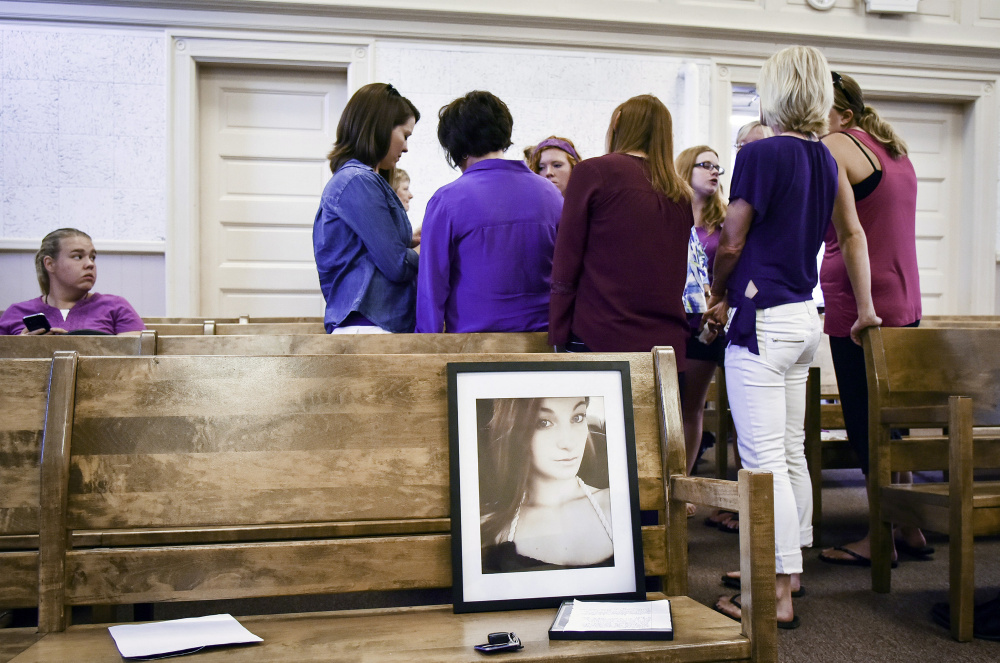FARMINGTON — The Industry man who killed an East Wilton woman while driving drunk in the early hours of New Year’s day was sentenced Monday to serve at least three years in prison.
Tommy Clark, 25, of Industry, was sentenced to seven years, with all but three suspended and three years of probation, and a 10-year license suspension for aggravated operating under the influence. He was also sentenced to four years in prison, with all but three suspended, for leaving the scene of an accident. The prison time is concurrent, meaning Clark will serve at least three years.
At Monday’s 1 p.m. sentencing hearing, Franklin County Judge William Stokes accepted the guilty pleas of Clark on charges of aggravated operating under the influence, Class B, and leaving the scene of an accident resulting in injury or death, Class C, in connection with the Jan. 1 death of Taylor Gaboury, 21, of East Wilton.
About 40 family members and friends of Gaboury packed the Franklin County Superior courtroom for the roughly two and a half-hour sentencing, most of them wearing Gaboury’s favorite color, purple, and holding flowers and photos of Gaboury.
Gaboury’s parents, her brother Cody and three family friends spoke before the sentencing, asking the judge to impose the maximum sentence for each charge as penalty for the death of Gaboury, who they described as bright, caring and driven.
The sentence “will never be enough for our daughter. It’s something, and hopefully (Clark) gets the message,” Ricky Gaboury, Taylor Gaboury’s father, said outside of the courthouse after Clark’s sentencing. “He’s probably a good individual, but there are so many circumstance of that evening where he could have been that nice person and he chose not to be.”
Gaboury was walking to her parents’ house in Farmington when Clark struck her with his vehicle while driving on U.S. Route 2 near Franklin Memorial Hospital around 1:40 a.m.
Gaboury was intoxicated the night of the accident and made the decision to walk home, according to Deputy District Attorney James Andrews. She was pronounced dead at the scene.
Clark told police after he was arrested that he knew he had hit something but didn’t know what it was. According to a police affidavit, he later told investigating officers that he was aware he’d hit a person.
Clark admitted to police after the accident that he checked on Gaboury after hitting her with his car, but when he realized she was dead, he fled to the Colonial Valley Motel in Farmington where he was staying and was later found by police.
Clark’s blood alcohol content at the time of the accident was 0.129 percent, nearly twice the legal limit of 0.08.
“I am at a loss for words,” Clark said in court Monday before his sentencing. “I have a hole in my heart, and I would trade my life to bring her back … I am sorry, but I know sorry is only a word.”
‘COSMIC INJUSTICE’
Andrews argued that the “cosmic injustices” of the Jan. 1 accident deserved an eight-year sentence with all but five years suspended and three years of probation for the aggravated operating under the influence charge. He also argued for a five-year sentence on the leaving the scene of an accident charge to run concurrently.
Gaboury “chose to walk several miles in the cold and dark alone to avoid the dangers of intoxicated driving,” Andrews said. “On the other hand, (Clark) drove while intoxicated … It’s that cosmic injustice of these two people coming together on that tragic night that injures the family very deeply.”
Farmington attorney Thomas Carey argued a four-year sentence with all but one year suspended and three years of probation for his client. Carey argued Clark was a good candidate for a probationary sentence because of Clark’s lack of a criminal record and compliance with his bail conditions since he was released in January.
In determining his sentence, Stokes weighed the non-intentional act of Clark killing Gaboury with the intentional act of Clark leaving the scene after determining she was dead, a determination which he said Clark did not have the capacity to do.
Both Andrews and Ricky Gaboury said Clark’s fleeing of the scene spoke to his character.
“Instead of being a man and owning what he had done and going to the hospital … (Clark) chose to run away and leave her in a cold snowy ditch, leaving her to die like an animal,” Ricky Gaboury said addressing the court prior to sentencing. “Tommy Clark is the animal.”
Andrews said that after realizing he had hit someone, Clark went down into the embankment where Gaboury had landed after being struck and “held her in his arms,” getting her blood on his jeans, before making the decision that she was dead and left the scene. He added that this all occurred within a few hundred feet of Franklin Memorial Hospital, where Clark could have gone to alert medical professionals rather than making the determination that she was dead.
Having left his two passengers at the scene to call 911 after determining that Gaboury was dead, Clark did not leave the victim alone, Carey argued and said that medical help was there promptly.
After driving back from a bar in Farmington to the Colonial Valley Motel in his Dodge Dart with two passengers, Clark decided to get in the car again and drive himself and his passengers to Wilton to see a holiday light display, Stokes said. After finding there was no display, Clark began to drive back on U.S. Route 2 east, where he ultimately hit and killed Gaboury.
The two passengers he left initially told police they were alerted to Gaboury’s body by a boot they saw in the roadway. After police found the story suspicious, they returned to the Colonial Valley Motel where they had dropped off the women and found Clark sitting in a car next to his Dodge Dart, which had visible damage on the front passenger side, according to court records.
Clark’s mother, Penelope Clark, told the courtroom Monday that she believes her son fleeing the scene was due to the fact that he watched his father die when he was young.
“He saw his dad lying there, and all he could do was run,” Penelope Clark said. “He left because of traumatic stress.”
Penelope Clark said she was not defending her son’s actions of drunk driving, but she felt she needed to defend why he fled. In the months since the accident, she said she was worried Clark was going to commit suicide.
“He would have gladly given his life for her,” she said.
As the driver of the vehicle, it was Clark’s responsibility to stay at the scene, Stokes said.
In his sentencing argument, Carey also brought forth the report of the accident reconstruction done by Maine State Police, in which Sgt. Darren Foster stated that Gaboury was walking east on Route 2 with her back facing traffic and was wearing all black, which could have been contributing factors to the accident.
However, Foster could not conclude whether Clark’s intoxication was the primary cause of the accident or was a contributing factor.
While Stokes accepted that reconstruction experts indicated that Gaboury’s actions may be contributing factors, she was not driving a vehicle.
“Taylor was not driving a ton and a half vehicle; she was walking,” Stokes said. “She did not get behind the wheel; the defendant did.”
Andrews claimed witnesses said Clark was driving aggressively and throwing cigarettes at other drivers on New Year’s Eve. However, Stokes said none of the witness statements attached to Andrews’ sentencing memorandum indicated Clark specifically as the driver of the vehicle they saw.
In giving his sentence, Stokes said when determining how much of the sentence should be suspended, he looked at Clark’s lack of a criminal record, his compliance with his bail terms, his full-time employment prior to the accident, his proactiveness in seeking counseling after the accident and taking responsibility for the crimes by pleading guilty and sparing the family a trial.
“Mr. Clark is not a monster. What Mr. Clark did was very wrong. He’s going to be held responsible for that,” Stokes said. “But there is good in Mr. Clark, and he should be recognized for that.”
As a part of his sentence, Clark must also pay $2,100 in fines and $250 in restitution to the Farmington Police Department for tests run in connection with the accident. When Clark is released from prison, his bail conditions will prohibit him from consuming and possessing drugs or alcohol, and he must attend alcohol counseling.
VICTIM IMPACT
Stokes stressed to the Gaboury family that while Clark will only serve three years in prison, his sentence is seven years, and if he violates his conditions of release, he will be sent back to prison for the remainder of his sentence.
“The victim impacts (statements),” Stokes said, taking a long pause. “It renders you almost speechless.”
Outside of the courthouse, friends and family of Gaboury gathered behind a sign that said, “Our Lives Matter.”
Tena Trask, Taylor Gaboury’s mother, and Ricky Gaboury told members of the media that they will approach the Legislature under that slogan with a campaign against drunk driving.
While Ricky Gaboury did not say specifically that they would be advocating for stricter sentences for cases involving drunk driving, he said they will take the time until the Legislature meets in January to develop an action plan.
“We’re not sure how we’re going to approach the Legislature with it, but yeah, we need people to learn that if they do something bad like this, it is going to reflect,” Ricky Gaboury said.
Stokes repeatedly said he cannot comprehend the loss that the Gaboury family is going through. After 25 years prosecuting homicides, he said he had no idea how families of victims carry on with their everyday lives.
For Taylor Gaboury’s family, they say their friends and community have given them strength.
Trask said in court that the birth of her daughter made her a better person, and from the moment Gaboury was born, Trask promised to fight for her and protect her.
In grieving the loss of her only daughter, Trask said she will channel the type of person her daughter was.
“Taylor was one of the most forgiving people ever, and she could probably forgive him a whole lot easier than I am going to be able to,” Trask said. “I’m just going to try and live in her honor.”
Lauren Abbate — 861-9252
Twitter: @Lauren_M_Abbate
Send questions/comments to the editors.

